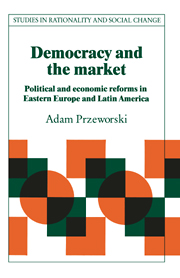INTRODUCTION
Published online by Cambridge University Press: 05 June 2012
Summary
To eat and to talk – to be free from hunger and from repression: These elementary values animate a worldwide quest for political democracy and economic rationality. In the past fifteen years, Greece, Portugal, Spain, Argentina, Bolivia, Brazil, Chile, Paraguay, Peru, Uruguay, South Korea, Pakistan, the Philippines, Turkey, Poland, Hungary, Czechoslovakia, Bulgaria, Slovenia, Albania, and Algeria have held democratic elections, the first ever, or at least the first in decades. Even in the Soviet Union, the first timid opening met with a massive expression of popular will and forced democracy onto the political agenda. Never have so many countries enjoyed or at least experimented with democratic institutions.
At the same time, models of economic development that were successful over several decades collapsed in some countries. The economic crises facing Argentina, Brazil, and Mexico as well as Hungary, Poland, and Yugoslavia are without precedent in the history of these nations. As a result, we witness a frantic search for new models and new strategies that could generate sustained growth. In many countries, after many failed reforms, entire economic systems are now being transformed.
In the realm of both politics and economics we observe attempts to make a radical break with the past; in fact, in both realms the word “transitions” best describes the processes launched in a number of countries. These are transitions from authoritarianism of several varieties to democracy and from state-administered, monopolistic, and protected economic systems, again of several varieties, to a reliance on markets.
- Type
- Chapter
- Information
- Democracy and the MarketPolitical and Economic Reforms in Eastern Europe and Latin America, pp. ix - xiiPublisher: Cambridge University PressPrint publication year: 1991

